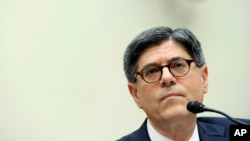U.S. Treasury Secretary Jack Lew says the pace of economic reform and the need for further appreciation of China’s currency will be among the issues at next week’s (July 9, 10) Strategic and Economic Dialogue in Beijing. Lew also does not see cyber-spying as an impediment to improving relations between the world’s top two economies.
Speaking Tuesday to the U.S.-China Business Council, Lew said he expects further progress at next week’s dialogue. He pointed to China’s commitment to open its economy more to outside investment and said that since 2010, China’s currency, the yuan (RMB), has appreciated 14 percent.
"It still needs to appreciate more, it’s still undervalued, and that is something that hurts Chinese consumers. It reduces their purchasing power. One of the things that’s so important in terms of China’s economy is to increase consumer demand. But, it’s fundamentally not fair in terms of trading practices, which is why we press on it so hard," said Lew.
Lew said this is a threshold issue that is fundamental to the trust between the two countries. An undervalued currency tends to boost Chinese exports and hurts foreign competition.
He said China has widened the trading band of its currency in recent weeks, but described progress as taking two steps forward and at least part of a step back in getting towards a market-determined exchange rate.
Gary Hufbauer of the Peterson Institute for International Economics sees U.S. demands for greater currency appreciation as a non-starter for China:
"China is tightening up credit. This is causing a bit of a slowdown in economic activity in China. Also, China has a major anti-corruption campaign. You see these generals being arrested, which is extending right down into the provinces, and that’s cutting back on the big projects in the provinces. One of the offsets that the Chinese government is doing to keep business going is to resist appreciation of the renminbi," said Hufbauer.
Lew said a market-determined exchange rate coupled with a more open Chinese economy will be good for the U.S. economy and American businesses’ ability to compete on a level playing field.
"Frankly, I think it’s in China’s interest. If you look at China’s core economic plan, what they’ve put in their Third Plenum, the issues that I’ve just described are central to what they’ve adopted as their stated program. So, that’s why I am optimistic we’ll continue to make progress," said Lew.
Lew said progress has been mixed after China’s announcement of the Shanghai free-trade zone.
"I think it’s been, you know, a slow process. I think it started out with almost everything being put on the ‘closed’ list. Now, as things are taken off the ‘closed’ list, we’re finding that, just yesterday, a list came out, so we haven’t fully digested it. But, on first glance, it doesn’t appear to be of major interest for U.S. market access. So, it seems to be items that give you a number of things that are open, but not a lot of business activity," said Lew.
The Shanghai free-trade zone is being viewed as a template for ongoing negotiations on a bilateral investment treaty (BIT).
Hufbauer said the slow pace of reform in China is due, in part, to efforts by China’s new leadership to consolidate its control over the country’s vast national and provincial economies.
Lew praised the Chinese for their focus on enforcement of intellectual property protection, but called for a more sustained, continuous efforts to establish so-called “rules of the road.”
Lew also hopes the discussion on cyber-security, especially in light of recent allegations of hacking by Chinese military personnel of U.S. corporate trade secrets, will continue.
"There is a fundamental difference that we do not view it as an acceptable practice for governmental entities to participate in the process of, you know, securing trade secrets for the economic benefit of firms in their country. And, we’ve made that clear in a general way. We’ve made it clear in a rather specific way. And, I don’t think there’s any question but it’s a source of some difference between us. We need to engage on that, and we need to continue to engage on that, and I believe that there will be ongoing discussions," said Lew.
China says it, too, is a victim of U.S. cyber-spying. Hufbauer says the Obama Administration is trying to make the distinction between commercial espionage and governmental spying.
The U.S. Treasury chief says China’s real estate market bubble does not likely pose a global threat to financial stability. He says the country has the tools necessary to manage it internally.
Hufbauer said that as the two sides sit down next week in Beijing, U.S./China economic ties are much stronger than bilateral geopolitical relations, where the two sides view each other more as competitors.




